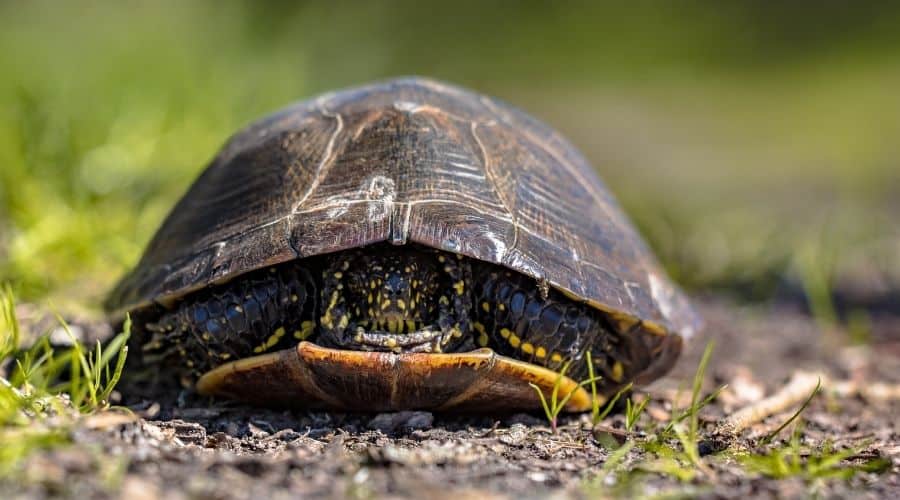When a turtle is frightened, it will pull its head in quickly, forcing air out of its lungs. It’s normal for a new turtle to be hesitant about you even when they’re well socialized. They recognize their usual caretaker.
Plus, turtles don’t show their interest or affection like a dog or cat. If you’re asking yourself, why is my turtle scared of me?
Your turtle is scared of you because it sees you as a threat. When scared, turtles will hiss or pull into their shells to hide from predators. Not many animals are a genuine danger to a grown turtle, but humans are one of the few that can hurt them. Turtles are bright, playful animals with excellent memories and survival skills.
Table of Contents
Why Is My Turtle Suddenly Scared Of Me
If your turtle was doing alright and their behavior changed suddenly, often the first thing you should do is see a vet to ensure that they’re still healthy.
When your turtle is suddenly scared of you, but they weren’t previously, it’s a sign of change. Hopefully, they are healthy.
Assuming your pet is physically alright, then it’s most likely a stress reaction. Environmental changes can cause behavior shifts.
For example, if you recently got a new tank or changed out an old warming rock for a new one, this can upset your turtle. Give them time to adapt.
Other changes like temperature are often overlooked but can still affect your pet’s behavior. Even something simple like a dietary change is enough to cause stress, which often leads to seemingly unfounded fears.
Turtles think differently than you, and their reactions mirror the difference.
Although we might not expect it, things like removing a turtle from their tank can be a problem for them. Particularly when you have a new turtle, the urge to take them places and play with them seems natural to you.
If it were a puppy, this would be a good bonding time. However, for your turtle, it’s a disturbance in their routine.
Make sure that, when you take the turtle out, you give them something interesting to do or a small treat, so they associate it with a positive experience.
Turtles have good memories, and they can learn from their past experiences.
Why Is My Baby Turtle Scared Of Me
Life is rarely easy for baby turtles. When your baby turtle is scared of you, it may be instinctive self-preservation.
Although their larger counterparts are mostly predator-proof, babies often get eaten in prodigious numbers.
Eating helpless baby turtles is so common that scenes of them trying to make it to the ocean amid flocks of birds and sharks waiting in the water if they get that far have become part of pop culture.
Not all turtles have it as rough as those who hatch on the beach, but they are still small, tasty, and defenseless. Baby turtles are shy. Running and hiding is their best defense.
The baby turtle will get used to you over time. Move slowly, and don’t drag it out of wherever it sneaks off to unless it’s in danger.
Instead, offer your turtle food when it’s feeding time, and handle it gently while it’s in the aquarium or enclosure at first.
How Do You Tell If Your Turtle Is Scared Of You
A turtle that avoids you and runs away is scared of you, but there are several other ways to tell. For example, turtles pull into their shells to hide from predators.
You may not want them to see you this way, but remember, you are much larger than your turtle.
According to All Turtles, “Turtles generally hiss because they are scared. Since turtles do not have vocal cords, the hissing sound is produced when air is expelled rapidly from their lungs when they tuck their head into their shell. … If your turtle hisses a lot, it may mean that it isn’t comfortable.”
Another way to tell that a turtle is scared is when it bites. This behavior is not limited to snapping turtles.
Most species of turtles will nip, bite or snap out of fear, though snapping turtles do it more often. Be patient with your frightened turtle, and they will learn that you are no threat.
How Do I Make My Turtle Not Scared Of Me
Turtles can take a while to warm up to humans. It may hurt your feelings if your pet runs and hides, but it’s an opportunity to foster trust and learn how to make your turtle less scared of you.
Positive, rewarding changes will help them feel more at ease.
While this type of pet may never play fetch, or roll over for you, they need stimuli and enrichment, or they get bored and depressed. Boredom can lead to fearful behaviors.
Give your naturally curious turtle toys like sturdy balls they can’t eat, flashing children’s toys, and even new rocks or sticks to interact with once in a while.
If you’re raising a small or young turtle, start by handfeeding them to help them warm up to you. Move slowly, offer them food, and don’t get jumpy if your pet darts or tries to bite.
Over time they will learn that you are the food provider, not the turtle eater.
Helpful Tips To Know About Why My Turtle Is Scared Of Me
Turtles are omnivores, so they eat meat, but they aren’t fighters, which is why they have such thick shells. Being scared is a survival mechanism. With time and patience, it will pass.
Here are more helpful tips to know about why your turtle is scared of you.
- Many people read a turtle’s natural reticence as fear. If your turtle gets out of its shell and plays or watches you with interest they aren’t scared. On the contrary, they are showing trust and even affection for you. Just because they don’t play ball or give cuddles, it doesn’t mean your turtle is scared. They are likely just being a turtle.
- Lots of turtles enjoy being petted on the head, or a good shell rub. However, when they don’t want the attention you need to step away. Trying to force a positive interaction can lead to negative consequences.
- Your pet turtle will learn to associate you with food and may get excited and start rushing at you, which can seem like it’s freaked out, but this isn’t aggression. He’s begging for attention (aka food). Turtles associate us, humans, with food, so they get all excited when they see us around. He’s not necessarily hungry, though, so don’t give in and start feeding him more. They’ll eat as many times as you put food in there, but that is definitely not good for them.
Final Thoughts
If your new turtle is afraid of you, don’t feel bad, it’s just their nature to be overcautious. However, if you have an established pet and their behavior changes suddenly, it’s most likely from stress or illness.
You may need to visit the vet. However, turtles are intelligent and long-lived with good associative memories, and you can build or rebuild trust with them and put them at ease if you take the time.
Because they are different from mammals, we don’t always recognize their behavior as easily as a dog or cat, but your pet will learn who you are, and you can even bond with them if you have patience.

